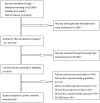Association Between Tea Drinking and Cognitive Disorders in Older Adults: A Meta-Analysis of Observational Studies
- PMID: 35547628
- PMCID: PMC9083466
- DOI: 10.3389/fnagi.2022.845053
Association Between Tea Drinking and Cognitive Disorders in Older Adults: A Meta-Analysis of Observational Studies
Abstract
Introduction: Previous research has shown that tea drinking has a bearing on Cognitive Disorders, but the conclusions are inconsistent. The purpose of this research was to systematically assess the published evidence pertaining to tea drinking and the risk of cognitive disorders in older adults using a meta-analysis, and to concurrently evaluate the dose-response association.
Design: A meta-analysis.
Setting and participants: We used the PubMed and Web of Science databases for a literature search until 30 May 2021. We initially retrieved 20,908 studies (14,884 from PubMed and 6,024 from the Web of Science), Thirty-six studies met the inclusion criteria (7 case-control, 16 cohort, and 13 cross-sectional studies), involved 224,980 participants.
Methods: Pooled odd ratios (ORs) with their corresponding 95% confidence intervals (CIs) were used to evaluate the strength of the association under a fixed- or random-effect model according to heterogeneity test results.
Results: The results showed that drinking tea was negatively associated with cognitive disorders (OR: 0.76, 95% CI: 0.70-0.82). Moreover, dose-response associations were found between tea drinking and cognitive disorders (1 time/day: OR, 0.81; 95% CI, 0.70-0.95; 1 cup/day: OR, 0.86; 95% CI, 0.78-0.94). In addition, subgroup analyses were performed according to study designs, study population, types of tea drinking, outcomes and methods used to assess outcomes. Most of the results in the subgroup analyses were consistent with the main results.
Conclusion: The results of the present study provided abundant evidence that tea drinking is inversely proportional with the occurrence of cognitive disorders in older adults. A linear dose-response association between tea drinking and decreased prevalence of cognitive disorders was found.
Keywords: congnitive disorders; dose-response; meta-analysis; older adults; tea drinking.
Copyright © 2022 Shi, Cao, Liu, Zhou, Zhao and Xia.
Conflict of interest statement
The authors declare that the research was conducted in the absence of any commercial or financial relationships that could be construed as a potential conflict of interest.
Figures




Similar articles
-
Meta-Analysis of the Association between Tea Intake and the Risk of Cognitive Disorders.PLoS One. 2016 Nov 8;11(11):e0165861. doi: 10.1371/journal.pone.0165861. eCollection 2016. PLoS One. 2016. PMID: 27824892 Free PMC article.
-
Fruit and Vegetable Consumption and Cognitive Disorders in Older Adults: A Meta-Analysis of Observational Studies.Front Nutr. 2022 Jun 20;9:871061. doi: 10.3389/fnut.2022.871061. eCollection 2022. Front Nutr. 2022. PMID: 35795585 Free PMC article. Review.
-
Association between tea consumption and risk of cognitive disorders: A dose-response meta-analysis of observational studies.Oncotarget. 2017 Jun 27;8(26):43306-43321. doi: 10.18632/oncotarget.17429. Oncotarget. 2017. PMID: 28496007 Free PMC article.
-
Does tea consumption correlate to risk of fracture? A meta-analysis.Int J Clin Exp Med. 2015 Jun 15;8(6):8347-57. eCollection 2015. Int J Clin Exp Med. 2015. PMID: 26309487 Free PMC article. Review.
-
Caffeine intake from coffee or tea and cognitive disorders: a meta-analysis of observational studies.Neuroepidemiology. 2015;44(1):51-63. doi: 10.1159/000371710. Epub 2015 Feb 17. Neuroepidemiology. 2015. PMID: 25721193
Cited by
-
The Relationship between Beverages Consumption and Cognitive Impairment in Middle-Aged and Elderly Chinese Population.Nutrients. 2023 May 15;15(10):2309. doi: 10.3390/nu15102309. Nutrients. 2023. PMID: 37242194 Free PMC article.
References
-
- Battle D. E. (2013). Diagnostic and statistical manual of mental disorders (DSM). Codas 25 191–192. - PubMed
-
- Biasibetti R., Tramontina A. C., Costa A. P., Dutra M. F., Quincozes-Santos A., Nardin P., et al. (2013). Green tea (-)epigallocatechin-3-gallate reverses oxidative stress and reduces acetylcholinesterase activity in a streptozotocin-induced model of dementia. Behav. Brain Res. 236 186–193. 10.1016/j.bbr.2012.08.039 - DOI - PubMed
-
- Bigby M. (2000). Odds ratios and relative risks. Arch. Dermatol. 136 770–771. - PubMed
Publication types
LinkOut - more resources
Full Text Sources
Miscellaneous

